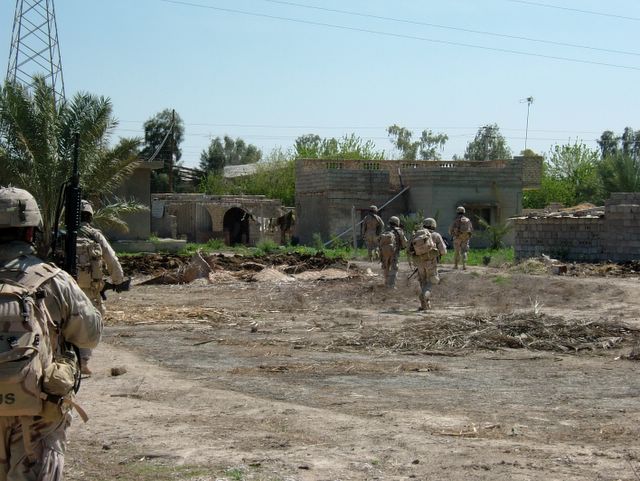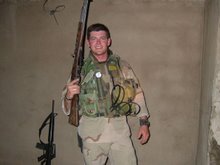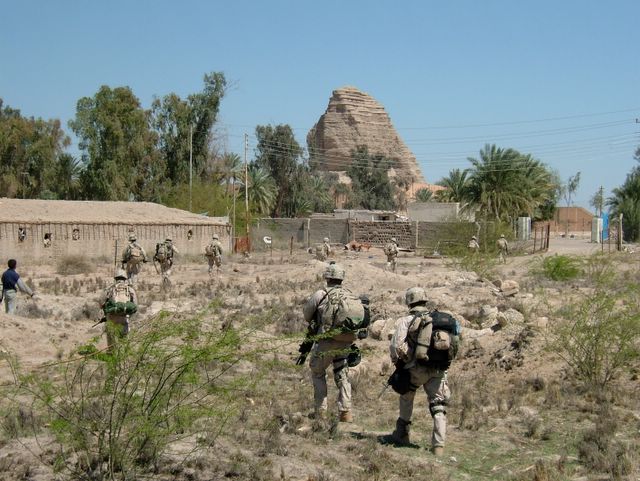Marines Return to Beirut to Aid U.S. Evacuation
July 21, 2006
The Conflict
Marines Return to Beirut to Aid U.S. Evacuation
By JAD MOUAWAD and STEVEN ERLANGER
BEIRUT, Lebanon, July 20 — United States marines landed in Beirut on Thursday for the first time in more than 20 years to help evacuate Americans from Lebanon, as Israeli officials suggested that Israeli ground troops might take a more active role in combating the Hezbollah militia. There were also more strong condemnations of Israel’s heavy use of force in Lebanon.
With the fighting continuing for a ninth day, fierce clashes erupted between Israeli troops and Hezbollah fighters inside Lebanon. Hundreds of Israeli troops were trying to destroy Hezbollah outposts and storage facilities, Israeli Army officials said.
Two Israeli soldiers and a Hezbollah fighter were killed late Wednesday as Israel discovered a warren of storage rooms, bunkers and tunnels. The death toll in Lebanon for the nine days passed 300; the vast majority were said to be civilians.
On Thursday evening, two Israeli soldiers were killed and three others wounded in further fighting. At least two Hezbollah fighters were believed to have been killed.
The Israeli defense minister, Amir Peretz, visiting northern towns hit by scores of Hezbollah rockets, hinted at a broader ground operation. “We have no intention of occupying Lebanon, but we also have no intention of retreating from any military measures needed,” he said. “Hezbollah must not think that we would recoil from using all kinds of military measures against it.”
Mr. Peretz continued, “You can mark one thing down: Hezbollah flags will not hang over the fences of Israel.”
At the United Nations, Secretary General Kofi Annan condemned the Israeli operation as an “excessive use of force.”
Russia, which reduced parts of Chechnya to rubble in its fight against rebels there, also sharply criticized Israel, with the Foreign Ministry calling Israel’s actions in Lebanon “far beyond the boundaries of an antiterrorist operation” and urging a cease-fire.
At the White House, President Bush’s press secretary, Tony Snow, said, “I’m not sure at this juncture we’re going to step in and put up a stop sign,” although he called on Israel to “practice restraint” and said that Mr. Bush was “very much concerned” about a growing human crisis in southern Lebanon.
Secretary of State Condoleezza Rice is arranging a trip to Asia and the Middle East; she could be visiting this region as early as Sunday.
Diplomats are investigating the idea of a more robust international force under United Nations auspices but more likely made up of European troops, that could help the weak Lebanese government move its army to the Israeli border and push back a weakened Hezbollah.
Ephraim Sneh, Israel’s deputy defense minister and a former Israeli commander in Lebanon, told Israeli television: “We have no choice but go in and physically clean up Hezbollah posts on the ground. The air force can’t do that. So when we talk about a ground operation, the intention is not necessarily a massive incursion but more pinpoint operations.”
The small force of about 40 marines who landed in Beirut on Thursday were the first American military personnel to be deployed in Lebanon since the withdrawal of forces after a Hezbollah suicide bomb attack killed 241 Americans, mostly marines, in 1983. The marines who landed Thursday were from the same unit as those killed 23 years ago.
Lt. Cmdr. Charlie Brown of the United States Naval Central Command in Bahrain said a small number of marines from the 24th Marine Expeditionary Unit landed on a beach north of Beirut, near shorefront belonging to the American Embassy on Thursday morning. They helped American citizens board a landing craft that ferried them to the amphibious assault ship Nashville stationed offshore.
By late afternoon, 1,052 evacuees had been boarded, and the Nashville was preparing to head to Cyprus, Commander Brown said.
Helicopters also evacuated 161 Americans on Thursday, the military said, and the Orient Queen, a cruise liner that had transported the first large group of American evacuees to Cyprus on Wednesday, was expected to reach Beirut on Thursday night for reloading.
A planeload of Americans who had been on the Orient Queen’s first trip to Cyprus arrived at the Baltimore/Washington International Airport on Thursday morning. Five more naval vessels are expected to arrive in the area on Friday, along with a high-speed ferry hired to transport evacuees to Cyprus, the military said in a statement.
Citizens of Britain and other countries were also evacuated.
On Thursday, Israel continued its large-scale air attacks on Hezbollah positions and equipment. It also leafleted southern Lebanese villages, made taped phone calls, informed local leaders and broadcast messages in Arabic to warn residents to move north of the Litani River if their villages contained Hezbollah assets or rockets, but gave no deadline.
Israel dropped similar leaflets on Thursday in Gaza as well, possibly foreshadowing more attacks on populated areas where Israel believes Hamas is storing Qassam rockets.
The air attacks on Thursday also hit Beirut’s southern suburbs, following Wednesday night’s heavy attack by Israeli jets, using special burrowing bombs, to try to penetrate a bunker believed to be used by senior Hezbollah officials, including its leader, Sheik Hassan Nasrallah. Hezbollah said no one was hurt in the bombing, which Israeli officials said involved 23 tons of explosives in the Burj al Brajneh neighborhood.
According to Al Jazeera’s Web site, Sheik Nasrallah said in an interview on Thursday that the two Israeli soldiers captured by Hezbollah in a raid last week would be freed only in the context of a prisoner exchange and otherwise would not be released even “if the whole universe comes against us.”
Hezbollah said its military capacity was largely undiminished. “The resistance has only used a small, small part of its strength,” Hussein Hajj Hassan told LBC television. “Nothing has been destroyed.”
Despite the continuous shelling of the Hezbollah strongholds of southern Beirut, the militia remains very much in control there, barring access to outsiders.
On Thursday, the militia led a group of reporters for a tour of the area, where Hezbollah’s headquarters are. Buildings as high as 12 or 15 stories had collapsed; some were still smoking.
According to Lebanese reports, four civilians were killed in a strike on a car in the coastal city of Tyre. Israeli jets also attacked a detention center in the town of Khiam in south Lebanon on Thursday, according to local television reports. The prison, formerly run by Israel’s Lebanese militia allies during its occupation of south Lebanon, was destroyed.
Israeli planes also struck at Shiite areas in the eastern towns of Baalbek and Hermil, where some Hezbollah leaders are said to live, and several southern villages.
About 50 rockets hit Israel on Thursday, the Israeli Army said, a sharp drop from 150 the day before.
The Israeli military reported that two of its helicopters collided near the border with Lebanon, injuring five of those on board.
In Gaza, Israel continued its military operation in the central sector, killing at least three Palestinians and wounding six in fighting around the Mughazi refugee camp. An airstrike on the same refugee camp killed one fighter and wounded eight more. One of the dead was a Palestinian girl, 10, wounded in an airstrike on Wednesday, when nine Palestinians, eight of them militants, were killed, according to The Associated Press.
The Israeli Army dropped the leaflets throughout Gaza on Thursday warning that “anyone who has, or is keeping an arsenal, ammunitions or weapons in their house must destroy it or will face dangerous consequences.”
On the West Bank, Israeli forces continued to surround the Mukata compound in Nablus, where Palestinians wanted by Israel have been taking refuge since Wednesday morning. About 15 wanted men gave themselves up but at least 10 remain inside. Tanks fired five shells at the buildings and army bulldozers worked to knock down the exterior walls, while warning those inside to come out or risk being buried underneath the rubble.
Israeli troops fired rubber-coated bullets at Palestinians who demonstrated against the troops, wounding five, one seriously, Palestinian medics said. About 4,000 Palestinians demonstrated in Nablus in support of Hezbollah, calling on the militia’s leader, Mr. Nasrallah, to attack Israel with rockets.
“Nasrallah, our dearest, strike, strike Tel Aviv!” the Palestinians shouted. Five Palestinians were killed in the Nablus operation on Wednesday.
The Lebanese government said it had so far sheltered as many as 120,000 refugees, mostly in public and private schools. It is considering setting up tents and temporary barracks for the refugees in public parks and sports fields. The United Nations estimates that a total of 500,000 people have been displaced.
“The losses are immeasurable,” said Nayla Moawad, the Lebanese minister for social affairs.
Ms. Moawad blamed Syria for setting off the crisis, saying that she was expressing her personal opinion. “The decision of the Hezbollah operation was not taken in Lebanon,” she said. “Lebanon was taken a hostage, a mailbox of other people’s interests. It has been taken in Damascus, probably with an Iranian coordination.”
Ms. Moawad was one of the leaders of the Lebanese revolt last year that led to the withdrawal of Syrian troops from Lebanon.
“Syria has tried to destabilize Lebanon since her troops pulled out,” she said.
Jad Mouawad reported from Beirut for this article, and Steven Erlanger from Jerusalem.












